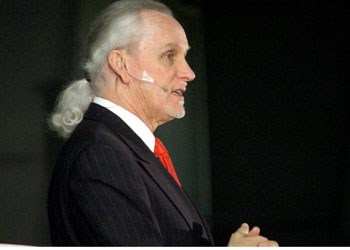Farming is constantly changing. With new technology coming on stream and new challenges in the world, it's time for farmers to start looking to the future and what they need to do to support their business. In keeping with that fact, BASF's Knowledge Harvest tour is travelling across Saskatchewan connecting farmers with the company to talk about the future of farming. Last week representatives were in Yorkton.
Richard Worzel was the keynote speaker at the event, and he says there are three factors that are going to drive farming into the future. The first is an increase in population, as well as an increase in the middle class population, which means more people eating more food per person. He points to China, where the amount of food consumed tripled over a forty year period.
"You have not only more people in total, but also more calories per person so there's a multiplier effect. The demand for farm product, particularly food but other products as well, will rise very rapidly."
With the increased demand and increased yields, there comes a concern about actually moving that grain, a common problem on the prairies in 2014. Worzel says that there needs to be a response, because last year's crop is not a one-off.
"If you're going to grow 70 per cent more food, you're going to have to find 70 per cent more capacity to bring it to market. Part of the problem that western farmers are having right now is that the capacity isn't there, and it's compounded by weather problems... That is an issue that has to be addressed, it's partially a commercial issue, it's partially a financial issue, but it's also partially a political issue, and those will be issues that have to be addressed... This is not an issue that will go away."
Technology is the second component. With more data analysis and more computer-aided decisions and processes, the way farms grow will change significantly. It will also change what things are grown for, such as growing products used in plastics and polymers.
"You have smarter tools that produce better results and new potential products that mean technology makes farming smarter and more profitable."
One of the questions asked at the event concerned whether or not third world farmers can leapfrog those in places like Canada, due to their lack of existing capital investment. Worzel says that this question is highly relevant, and shows that there is a definite need to embrace new tech in farming in order to continue to compete, because the entire world is on an increasingly level playing field with tech. That said, he says that existing knowledge puts farmers at an advantage, and the technology is a tool to make better decisions.
"I don't think computers will ever decide what to plant. I think that it will provide another dimension to farmers to help them improve their decisions, but at the end of the day it's still going to be the farmer standing and looking over his field that makes the decision about what to plant and how to do it."
The third is climate change. Worzel says that there is no sense worrying about the initial causes of climate change, because it is here and farmers will have to deal with the results either way. That means more extreme weather and significantly less predictability. This can be a good thing when it works out well, such as the cold winter halting a northern march of pests, but it could be bad, and it's simply not knowing that is the struggle.
"If you know that March and April are going to be wetter than usual you might adjust what you plant. But if you don't know, and you go ahead and put the seed in the ground, and then the ground is too wet, there's not much you can do about it. It's the unpredictability of climate change that is the real problem. If you knew what was going to happen you could prepare for it."
On the positive side, it does mean that there is incentive to make farm equipment more efficient, in order to decrease the emissions and fuel consumption, which Worzel says means more profits in the long term.
Worzel says that across the tour, the province's farmers have been asking sophisticated, specific questions about the issues they are seeing in the future.
"Farmers are asking much more complex questions that are much more relevant. I was asked about pension funds investing in farm land, that's a topic that most people aren't even aware is happening... Generally speaking I have been asking questions that are focused on farming but not exclusive to farmers. It has been a real eye-opening experience. I always knew that this was a high-tech global industry, but the questions asked by farmers indicate that the level of sophistication in their thinking is beyond what I have been asked about by audiences generally."
While there are issues that need to be addressed, Worzel concludes that it is currently one of the most exciting times in history to be a farmer.




